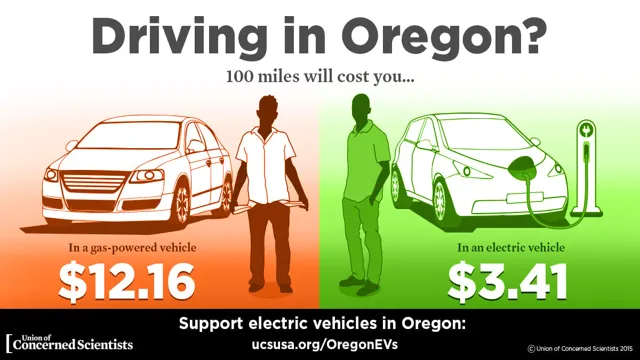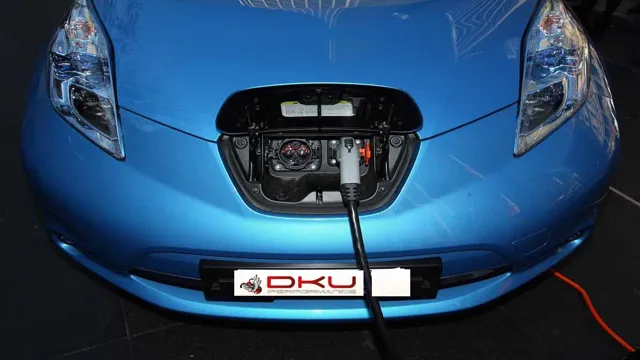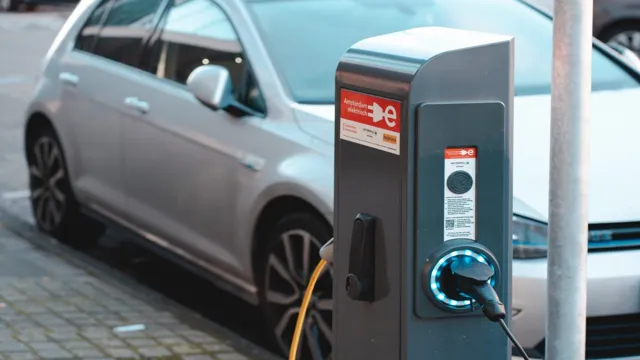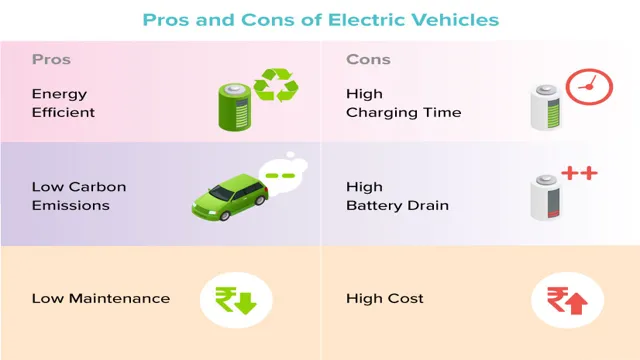Uncovering the Cost-Saving Benefits of Fueling Your Electric Car
Are you tired of spending a fortune on gas for your car and constantly filling up at the pump? Well, it may be time to consider making the switch to an electric vehicle. With the growing popularity of these cars, fuel savings with electric cars have become a hot topic amongst drivers. The cost of electricity is around one-third less when compared to gasoline, meaning you can expect lower fuel costs and significant savings over time.
Not only will electric cars save you money, but they are also better for the environment. Unlike gasoline vehicles, electric cars produce no emissions, making them an eco-friendly option for those looking to reduce their carbon footprint. In addition, many areas offer tax incentives and rebates for purchasing electric cars, making them even more affordable for drivers.
But what about the performance? Electric cars are often seen as inferior to their gasoline counterparts when it comes to speed and power. However, this is simply not true. In fact, electric cars have been shown to have faster acceleration and smoother handling, making for a more enjoyable driving experience.
Overall, fuel savings with electric cars can add up to impressive amounts, leaving you with more money in your pocket and a cleaner conscience. So why not make the switch today and start reaping the benefits of driving an electric vehicle?
Cost Comparison
When it comes to comparing the cost of electric cars versus gas-powered cars, one of the major benefits of electric cars is the fuel savings over time. The cost of charging an electric car is significantly lower than the cost of filling up a gas tank. This can add up to significant savings in the long run, especially if you are someone who drives frequently.
In fact, some studies estimate that the average electric car driver can save as much as $1,000 per year on fuel costs alone. Plus, with the increasing availability of public charging stations, charging your car on the go has never been easier. Overall, electric cars are a smart choice for those looking to save money on their transportation costs while also doing their part to reduce emissions and protect the environment.
Electric vs Gasoline Vehicles
When it comes to comparing the cost of owning an electric vehicle versus a gasoline vehicle, there are several factors to consider. While electric vehicles typically have higher upfront costs, they may save you money in the long run. Electric vehicles have lower fuel costs and require less maintenance due to their simpler design.
Additionally, they are eligible for federal tax credits and state incentives that can bring down the overall cost. On the other hand, gasoline vehicles have lower upfront costs and may be a more affordable option for those on a budget. However, the cost of fuel and maintenance can add up over time.
Overall, when considering the cost of owning a vehicle, it’s important to weigh the upfront costs with the long-term savings.
Electric vs Hybrid Vehicles
When it comes to electric vs. hybrid cars, one of the biggest factors to consider is the cost. While electric cars may seem more expensive upfront, they tend to have lower maintenance costs in the long run.
With a hybrid car, you may end up paying more for maintenance as you have both an electric motor and gas engine to maintain. Additionally, electric cars are more energy efficient, meaning you’ll save money in the long run on fuel costs. Of course, the cost ultimately depends on your driving habits and the model of car you choose.
It’s important to do your research and calculate the potential costs before making a decision.
Environmental Impact
One of the most significant benefits of utilizing electric cars is the positive impact they have on the environment, with fuel concerns being a critical factor in this. Generally speaking, electric car owners can solely charge their vehicles at home or at public charging stations. This means they can circumvent gas stations altogether, reducing fuel usage and emissions.
While electric cars are powered by electricity, which can come from sources such as natural gas, solar power, or wind power, they result in markedly lower emissions than traditional cars and don’t contribute to environmental problems like greenhouse gas emissions. Additionally, electric vehicles with larger batteries often include a feature called regenerative braking, which slows the car down by using the energy usually lost during conventional braking. This contributes to lowering overall energy consumption and creating a greener mode of transportation.
Therefore, adopting electric cars is a small step in helping the environment and reducing one’s carbon footprint.
Reduced Emissions
Reduced Emissions In today’s world, where climate change is a hot topic, companies have started to become more aware of their environmental impact. One of the ways in which businesses could reduce their impact on the environment is by minimizing their emissions. Emissions have an adverse impact on the environment, particularly on the air quality, which leads to many health problems.
Companies could minimize their emissions by using less energy, reducing transportation, and investing in renewable energy sources. A significant factor in reducing emissions is also implementing energy-efficient practices, such as switching off unnecessary lights and equipment. Companies that work to reduce emissions not only benefit the environment, but they also enjoy cost savings on their energy bills.
As consumers become more environmentally conscious, these businesses will also benefit from a positive reputation and loyalty from customers who support environmentally friendly practices.
Oil Dependence Reduction
Oil dependence reduction is a crucial issue in today’s world with staggering environmental impacts. The extraction, refining, and transportation of oil result in the release of a significant amount of greenhouse gases, leading to climate change. Additionally, oil spills can cause severe damage to marine and coastal ecosystems, which can take decades to recover.
The reliance on oil also has consequences for air quality, as the burning of fossil fuels releases harmful pollutants that can lead to respiratory diseases. To combat these issues, various initiatives are being taken to reduce oil dependence, such as promoting the use of renewable energy sources and implementing fuel-efficient technologies. With the increasing awareness of the importance of reducing oil dependence, we can take steps towards a more sustainable future.
Battery Recycling Efforts
Battery recycling efforts have gained immense momentum in recent years due to growing concerns over their environmental impact. The process of manufacturing batteries involves extracting raw materials and generating significant amounts of carbon emissions. When batteries are disposed of, the chemicals within them pose a serious risk to the environment and human health.
However, recycling used batteries not only reduces the risk of chemical leakage but also preserves valuable resources such as metals, lithium, and cobalt. Thanks to advancements in technology and the increasing awareness of people, many organizations are now paying greater attention to sustainable waste management practices. By implementing efficient and eco-friendly recycling methods, we can significantly reduce the environmental impact of batteries and ensure a cleaner and healthier planet for future generations.
Government Incentives
One of the biggest advantages of owning an electric car is the fuel benefit provided by the government. In many countries around the world, the government provides incentives for those who drive electric cars, including discounts on both fuel and taxes. This is because electric cars produce less pollution and have a lower impact on the environment.
Incentives differ from one country to the next, but in general, those who own electric cars can save a significant amount of money on fuel costs. For example, in the UK, electric car owners are eligible for a grant of up to £2,500 to help offset the cost of purchasing an electric vehicle. They are also exempt from paying road tax, and they get a fuel benefit which means they pay less to fill up their car.
Overall, the benefits of owning an electric car extend well beyond the initial purchase price, and it’s clear that governments are actively encouraging people to make the switch.
Federal Tax Credits
When it comes to solar energy, government incentives can significantly reduce the cost of installation. One of the most popular incentives available today is the Federal Tax Credit. This credit allows homeowners to receive a credit of 26% of the total cost of their solar panel installation when they file their federal income taxes.
This means if your total installation cost is $10,000, you will receive a tax credit of $2,600. It’s important to note that the tax credit only applies to the purchase and installation of solar panels for your primary residence, and not for rental properties. Additionally, the tax credit will decrease over time, so it’s best to take advantage of it while it’s still available.
The Federal Tax Credit is a great way to make solar energy more affordable for homeowners, and it’s an excellent incentive to take advantage of before it expires.
State Level Benefits
Government incentives are available to businesses operating at the state level. These benefits are designed to encourage investment and attract new businesses to the area. Some of the most popular incentives include tax breaks, grants, and low-interest loans.
Tax breaks can be especially helpful for businesses that are just getting off the ground, as they can help reduce the burden of startup costs. Grants can also be a useful tool, as they provide funding for specific projects or activities. For businesses that need capital to grow, low-interest loans may be the way to go.
These loans can be used to purchase equipment, hire employees, or fund other business expenses. Whatever type of incentive a business chooses, it’s important to do the research and carefully consider all options before making a decision. Taking advantage of state-level benefits can be a great way to position a business for success and growth.
Future of Electric Cars
Electric cars have become increasingly popular due to their many benefits, including fuel savings. Electric cars run on electricity, which is significantly less expensive than gasoline. According to the Department of Energy, on average, it is three times cheaper to drive an electric car than a conventional gasoline car.
In addition, electric cars do not require oil changes or regular maintenance, which further reduces overall costs. Furthermore, as the cost of electricity continues to decrease and the availability of renewable energy sources increase, electric cars become even more cost-effective. However, there are still charging challenges that electric car owners face, such as the need for more public charging stations and longer charging times.
Despite these challenges, the future of electric cars looks promising with continued advancements in technology. Overall, the fuel benefit of electric cars significantly reduces the cost of ownership and helps pave the way for a cleaner, more sustainable future.
Conclusion
In conclusion, the fuel benefit of electric cars can be summed up in three words: efficient, cost-effective, and environmentally-friendly. By eliminating the need for gasoline, electric cars reduce both fuel costs and greenhouse gas emissions. Plus, with cutting-edge technology and increasingly widespread charging infrastructure, electric cars are becoming more convenient and accessible than ever before.
So, if you’re tired of spending big bucks at the pump and want to do your part for the planet, it’s time to join the electric car revolution. It’s a win-win situation that’s hard to resist!
FAQs
What is fuel benefit on electric cars?
Fuel benefit on electric cars is the cost savings you get from not having to purchase gasoline or diesel.
Can you claim fuel benefit on electric cars as a business expense?
Yes, electric cars are eligible for fuel benefit as a business expense and can be claimed on your tax return.
How much can you save on fuel benefit with an electric car?
The cost savings will vary depending on the price of gasoline or diesel in your area and the efficiency of your electric car. However, on average, electric car drivers can save up to $1,000 a year on fuel benefit.
Are there any additional incentives for purchasing an electric car besides fuel benefit?
Yes, many states and local governments offer additional incentives for purchasing electric cars such as rebates, tax credits, and free parking. Additionally, electric cars are exempt from certain taxes and fees.




